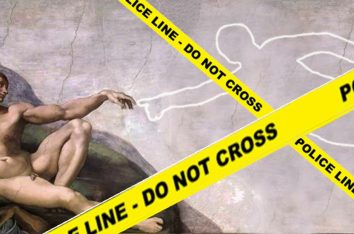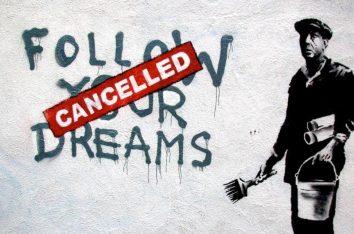I was recently watching HBO’s new documentary on Scientology, Going Clear, and was astounded at how so many wealthy, powerful, and seemingly intelligent people have bought in to L. Ron Hubbard’s bizarre and sci-fi inspired vision of the world. 75 million years ago some god called Xenu transported a bunch of humans to earth in a spaceship and dumped them into volcanos? Really? And Maverick from Top Gun buys into this shit?
But it quickly occurred to me that any system of beliefs — including the Catholic one to which I hold (albeit poorly) — is equally bizzare-sounding at first blush. God became a man and died and rose again from the dead? Really? And Riggs from Lethal Weapon buys into this shit?
The fact is that the only reason any belief system sounds reasonable to a person or a society is because they’re used to it. Christianity’s notion of theosis sounds no less crazy than Mormonism’s belief that the faithful will one day be gods over their own planets or Islam’s hope for 70 virgins in the afterlife. In this case, familiarity breeds not contempt but consent — if you grow up hearing something often enough it becomes more and more plausible (especially if the belief is held by the majority of the surrounding community).
Lest the non-religious take this opportunity to look down their noses at us superstitious mystics, I would remind you that there are plenty of secular versions of supernaturalism. One obvious example is an iron-clad adherence to the theory of evolution. While I as a Catholic have no real problem with the idea as such, I do marvel at the absolute certitude and borderline-evangelistic zeal with which its its proponents hold it (not to mention their anathematizing its detractors and banishing them to intellectual and cultural hellfire and brimstone). My point has nothing to do with whether evolution is true, and everything to do with the idea that an untestable narrative of origins that took place billions of years ago can apparently be held to with tenacious impunity, while a belief in other equally fantastical ideas is mere backwardness and superstition.
Another example is love. Who doesn’t love love, and being in love? Indeed, were it not for this, the majority of art, poetry, films, and music would not exist. And yet the existence of love is something we must accept by an act of faith, since love is not a physical substance in the brain or nervous system that can be implanted, removed, or examined in a test tube. It’s just there, something whose presence we celebrate or whose absence we lament. It’s bigger than us, like an ocean is bigger than us, which is why we fall in it, rather than the other way around.
Of course, the crassest of atheists will insist that love really is nothing more than a trick our physical brains play on us, a sham and farce no different from Santa Claus or the Tooth Fairy. But for my part, any account of the universe without love as central to its metanarrative not only fails to do any justice whatsoever to the human condition as it is actually experienced by most of the world (especially by children too pure and unsophisticated to yet be atheists), but is simply too cold, unimaginative, and boring to be true.
So you can keep your closed system with its grinding gears and rigid laws. I’ll take priestcraft, myth, and magic any day.
And love. . . .





I’ll take and keep my belief as God’s word.
Scientologist? Well let’s just say I will pray for them.
Athiest. I pray for them.
God is my salvation
Bingo on the irrationality of faith.
Bingo on evolutionary fundamentalism. (Really, faith that God created ex nihilo is back asswards? Maybe, but it takes a lot of “faith” to believe I evolved from a fish.)
Gong on the subtle romanticism of “falling in love.” Gay.
Great post.
I especially like the reasons for reasons for rejecting any system that excludes love, or is so reductionist as to deny it’s reality, namely:
“[it] is simply too cold, unimaginative, and boring to be true.”
Atheists you are boring, next.
Zrim,
Funny, your mom just wrote me and said she really loved that part. . . .
That’s because she went to college.
This is beautiful. And I wholeheartedly agree. If I die, and there is no God to greet me, at least I lived a life of hope and happiness waiting for it. I mean really, the worst that could happen is all of me fails to exist in any form at all. At that point, I won’t even know I was wrong. That is better to me than the other option of a lack of hope in the afterlife, or worse an uneasiness in what will be and a failure to enter the gates of heaven because I didn’t care enough to really commit or believe.
There is such a thing as the science of biology, and what I fear in our christian churches is that we too often place a metaphorical “no scientists allowed” sign on the doors of our churches.
this blog with articles like this, warfield on evolution would be a good one for your readers to peruse.
Jason, the faith/science debate rages. I leave you with a quote from Richard Feynman from his THE RELATION OF SCIENCE AND RELIGION
This is the most mind numbingly ignorant and inaccurate thing I have read in a while. Go back to school Jason and learn a thing or too about reality.
*Go back to school, Jason, and learn a thing or TWO about reality.
Well, I have a thingertoo to say. First, I agree with you Jason. But a difference between believing in godless evolution, and Jesus rising from the dead is, there were witnesses to Jesus’ resurrection. Many witnesses. (I can’t think of any other religion that claims something unbelievable happened that has over 500 witnesses. How many do the Mormons have? Two?) Whereas, no one has yet witnessed a fish growing legs and becoming a man. (I know I oversimplify) If you don’t believe in God, then evolution is the only option you have, as unbelievable as it is. If you do believe in God, then…evolution is still an option. I personally can’t buy it. I think many non christians can’t either, thus, scientology. If I weren’t a Christian, I think I would find scientology more plausible than evolution. However, I think I like Tolkien’s myth the best. We were sung into existence. I think I’ll go with that. Love the podcast. Your friendship with Christian is what gives hope to people. Just keep talking.
Eduardo, at the same time though, nobody witnessed the first 7 days of creation. And none of us believers today have witnessed the risen Christ. Thomas’s witnessing seems instructive, since Jesus said that more blessed are you and me who have not seen and yet believed. Does that make Jesus a mystic and promoter of blind faith?
Zrim,
He didn’t say “more” blessed did he? He said, “Because you have seen me, you have believed; blessed are those who have not seen and yet have believed.” And they are…but not more so. Thomas spent a whole week of his life moping around in disbelief when he could have been rejoicing with his friends. He should have trusted them. So no, I don’t believe it is blind faith to believe in the risen Christ.
Definitely, when I was an atheist, I saw religious faith as being clearly irrational. Probably, even for a time after I came to faith in Christ, I struggled with how reason and Christian faith could be (and, I now believe, *are* friends, rather than enemies. Luther *did* say that reason is the devil’s whore… which makes me very glad to be part of a Christian tradition (Catholicism) which vehemently disagrees with that statement *and* which has room for evolution as at least an option but not a dogma! 🙂 Fides et Ratio, baby!! http://w2.vatican.va/content/john-paul-ii/en/encyclicals/documents/hf_jp-ii_enc_14091998_fides-et-ratio.html
@Christopher Lake:
http://www.iep.utm.edu/luther/
I am always struck by the either or that is always presented by people speaking about evolution. Evolution has been proven, in so many studies ( just search Darwin’s finches, for one example) but I simply think of evolution as the tool of the Eternal. And the simple elegance of DNA has “the Creator,Creatrix” written all over it.
Nothing to get in a sweat over. All is One. One is All. And all shall be well….
I totally agree, Michelle. As if religion makes no room for secondary causes!
Clearly I have been missing a lot of good thoughts for many months! Have you been reading Reset?How much does First Things or Crisis Magazine pay their contributors? Submit this one please:)
Here we go again….stupid auto correct. I asked if ou’ve been reading Ed Feser. And, I agree with I you about mystery,imagination, faith and so forth, vs. Natural materialism as a world view. Why opt for the latter soley when the first allows for both?